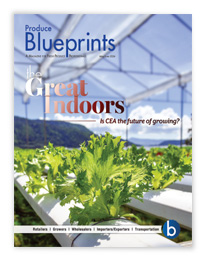Let me begin by asking a dumb question, of the sort that journalists should ask more than they do.
Blockchain technology is supposed to eliminate the possibility of fraud—in an ironclad fashion.
Indeed, crypto champions often claim that their shiny new technology is so immune to fraud and failure that it eliminates the need for regulation. (At least they did up until this week.)

Why, then, did FTX, a leading cryptocurrency exchange, collapse in such a spectacular fashion?
Luckily for me, I don’t have to answer that question, because apparently no one else has either.
To avoid the further task of explaining blockchain and cryptocurrency, let me refer you to this link.
All of this is headline news, but it relates to the produce industry.
They are meant to enforce provisions of the Food Safety Modernization Act (FSMA).
To sort through the tech speak as much as I can, these new regulations require records of “Key Data Elements” (KDEs) at “Key Tracking Events” (KTEs) in the supply chain: harvesting, cooling, initial packing, first land-based receiver, shipping, receiving, and transformation (e.g., processing).
What are these KDEs? Here are the ones for harvesting:
“Harvesting KDEs (Raw agricultural commodities (RACs) not obtained from a fishing vessel)
“• Location description for the immediate subsequent recipient (other than a transporter) of the food
“• Commodity and, if applicable, variety of the food
“• Quantity and unit of measure of the food
“• Location description for the farm where the food was harvested
“• For produce: – Name of the field or other growing area from which the food was harvested (must correspond to the name used by the grower), or – Other information identifying the harvest location at least as precisely as field or growing area name. . . .
“• Date of harvesting
“• Reference document type and reference document number.”
Frank Yiannas, Deputy Commissioner for Food Policy and Response at the U.S. Food and Drug Administration, calls the new rules “a game changer for food safety.”
Yiannas is no doubt right that these new rules will, if not improve food safety measures, at least make it easier to find exactly where they have failed.
But it is impossible to imagine how these measures can be put into effect without blockchain. The idea of keeping all these records on paper is unthinkable.
The National Grocers Association, which represents independent supermarkets, has expressed its reservations about the new rules, saying they will disproportionately harm smaller grocers.
One comment from the NGA press release raised my eyebrows: “NGA believes the new rule exceeds the FDA’s statutory authority. The Food Safety Modernization Act explicitly prohibits case-level tracking and electronic recordkeeping, both of which are included as requirements in this rule.”
These measures are meant to enforce FSMA, but they are specifically excluded from FSMA?
If I were a lawyer, I would be drooling now.
Of course, it is in everyone’s interest to ensure food safety to the greatest possible extent—and if that requires blockchain technology, so be it.
But the recent news about cryptocurrencies leads me to wonder about the infallibility of blockchain.
It is odd, and perhaps significant, that these new rules were announced at just the point when the world is most skeptical of blockchain currencies.



